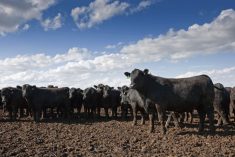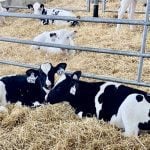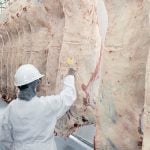Citing new federal regulations that made it uncompetitive, cull cow packer Gencor Foods (GFI) has shut down its Kitchener, Ont. plant effective Tuesday, laid off its 124 workers and announced plans to file for bankruptcy.
GFI, a subsidiary of Ontario’s producer-owned livestock genetics company Gencor, formed three years ago to process cull cows after the closure of the U.S. border to older cattle, stemming from the discovery of BSE in an Alberta cow in 2003.
The plant, which had offered a lease hook program to cattle producers and dealers from across Canada on four- to six-year commitments, processed about half of Ontario’s cull cows.
Read Also

B.C. ostriches culled, CFIA confirms
Ostriches on an embattled Edgewood, B.C. farm have been culled after a prolonged legal battle, the Canadian Food Inspection Agency has confirmed.
GFI’s operations allowed the province’s cattle producers to realize an extra $55 million from the cull animals, the company said in a statement on its web site Tuesday.
“Unfortunately, the re-establishment of normalized trade with the United States has brought with it new challenges,” the company wrote, referring to the re-opening in November 2007 of the U.S. border to Canadian cattle over the age of 30 months (OTMs), as well as the arrival of new, tighter rules here at home for handling specified risk materials (SRMs) from cattle at packing plants.
Unable to reach a suitable deal to sell the plant, GFI said it’s hired PricewaterhouseCoopers to file “a notice of intention to file a proposal” to GFI creditors. However, the company said it will still honour its obligations to pay producers for their processed cattle.
That move, the company said, was “due to the negative financial consequences GFI has experienced competing with American plants on an unbalanced playing field” in Ontario’s OTM cow market.
Following a tightening of Canada’s ban on ruminant-to-ruminant feeding in July 2007, which included new rules for collection and disposal of SRMs (the cattle tissues known to harbour the protein that causes BSE in infected cattle), packing plants in the U.S. are working off “much less rigorous” SRM rules, the company said.
“This lack of regulatory harmonization gives American plants at least a $39 per cow cost advantage over plants like GFI for cows they purchase in Ontario,” the company said, though it acknowledged some short-term relief from a $9 million provincial SRM program for abattoirs, announced in January.
“Unfortunately, with significant and ongoing operational losses and no federal assistance to address the lack of regulatory harmonization for SRMs, the status quo cannot be maintained,” the company said.
The expanded feed ban requires that SRMs be collected and stored separately from other inedible cattle parts and cannot be processed into fertilizer, nor into food or feed for any livestock or pets.













